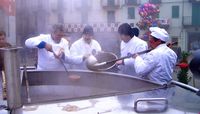Our Daily Bread: Why is this taste sacred?

WHAT’S SACRED IN THIS PHOTO? Hint: It’s not in the ladle. It’s in the hands. These men are continuing a centuries-old tradition of simmering beans and pork rinds for the annual pre-Lenten festival in the northwest Italian town of Ivrea. The town’s history stretches back thousands of years to a time when it protected access to Rome from France to the northwest. In the Christian era, the Ivrea Carnival was known across Europe for its huge meal served in the center of town.
Editor's note: This post is part of a series by Dr. Baker on Our Values about core American values. Dr. Wayne Baker welcomes guest columnist Kathy Macdonald. In a series of five columns, Kathy writes about how food defines our lives. Enjoy all parts in this series via links in the column below.
This week, we’re looking at foods that define us and foods that build healthier communities. We’ve explored why we often love the simplest foods—and the powerful links that form when we give food away.
OurValues is read by men and women nationwide (and some even read this column in Europe and Asia) as an experiment in encouraging civil dialogue on some of our world’s toughest issues. So, I’m going to close this series with the toughest question:
Why is your favorite taste sacred?
Let me explain, because OurValues isn’t a religious column. A friend of mine often travels and talks to groups about the glue that holds their community together. One question he asks is: “Why is this space sacred?” The question throws most people. They might be meeting in a church basement or a university classroom or a hotel ballroom at a conference. What my friend is asking is: What values truly make this place and this corner of the planet matter?
As we’ve seen this week, this is true of our tastes, too.
This past year I have done a great deal of work with Millenials, now in their late 20s and laying the foundations for their lives. I have been gratified by how many have begun to host monthly pot-lucks where they invite friends to bring a friend and a dish to pass around. They describe these events as times when they feel most alive and most connected to those they care about.
In the end, our experiences with food build indelible memories, healthy memories — memories someone could build a community on. Who knows? Even memories that could build a more peaceful culture.
What foods do you associate with places?
Why is that memory so potent for you?
And, why is that taste sacred?


Comments
Bill Wilson
Tue, Aug 7, 2012 : 11:37 p.m.
Wayne, Interestingly enough, "daily bread" often wasn't bread at all... it was actually beer. Beer is fairly easy to make, and lasts much, much longer than bread: critical to early man in his transition to agriculture.